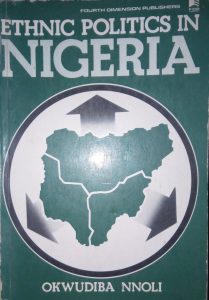It is just three years away and it might not be too early if that is what Prof Okwudiba Nnoli, the author of Ethnic Politics in Nigeria and his junior brother in ethnicity and ethnic conflict management, Prof Isaac Olawale Albert. The legendary Nnoli used to be at the University of Nigeria, Nsukka while Albert is at the University of Ibadan.

Canonical is under fire but there is still no law that forbids its usage
Ethnic Politics in Nigeria was published in November 1976, meaning that it will clock 50 in November 2026. It was a courageous move because, as Prof Okello Oculi would say, it was a Marxist clubbing of ethnicity. Since Marx had little to say on categories such as ethnicity bracketed off as secondary contradictions, that ability to bring ethnicity up through the Marxist lens must be the theoretical innovation there.
It has been a hugely successful book although it would, arguably, even be more successful were Nnoli to find the time to insert a postscript to so as to situate the book in the metatheoretical storms of the post-Cold War.
Ethnicity did not cause the fall of the USSR or even contribute to that crash substantially. USSR is a statement in the impossibility of a social totality that Enlightenment philosophy advances. But when the crash came, it assumed ethnic shape, with hitherto federating units returning to ethnic national roots. Many of the most dangerous militias in the world are ethnic. Genocides have assumed ethnic dimensions. The list is endless.
Intervention would say that Nnoli has produced a canonical (a word under serious contestation now) text, with particular reference to the dynamism of this mysterious concept called ethnicity and ethnic politics in Nigeria. But, what if an updated version of this book carry a postscript on ethnicity based on a relational theory of meaning?
As Prof Jonathan Joseph of the University of Bristol argues, it is not right to go to Marx to correct Marx. So also might it be said that it is not proper to go back to Nnoli to ask him to rework Ethnic Politics in Nigeria. But, Nnoli (at least from this picture) looks healthy and solid. Secondly, there is nothing like reading an established scholar navigating the pool, splashing critical muds here and there. Finally, have we got a successor who is relaxed enough from either involvement in state duties (Osaghae, Jibrin Ibrahim, Ibeanu, Sam Egwu) or activism to write the next version of that text?
If Reuben Ziri were still here, that is the guy to whom Nnoli could comfortably hand over the task to and go to sleep. Ziri now sleeps with the Lord. Since it is a postscript we are talking about, not a new book, it seems that might be the way to go. Thanks to God, three years is still a short, long way from here!
Nothing said so far implies that 2026 should not witness the mother of all conferences on ethnicity, a conference from which an epistemic statement on ethnicity and ethnic politics should be made from Nigeria.




























